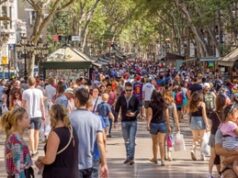 Sustainable design trends are touching every aspect of hospitality properties these days. Most manufacturers are touting a “green” product lineup, and consumers are asking hotel owners and brands what they are doing to improve their ecological footprint. It is common to hear about energy and water efficiency and healthy environments but what is going on with materials and furniture?
Sustainable design trends are touching every aspect of hospitality properties these days. Most manufacturers are touting a “green” product lineup, and consumers are asking hotel owners and brands what they are doing to improve their ecological footprint. It is common to hear about energy and water efficiency and healthy environments but what is going on with materials and furniture?
We can start with wood, a high percentage of the interior furnishings and materials in a hotel. We have all become more aware of the destruction from illegally harvested wood; illegal logging is a pervasive problem, causing enormous damage to forests and economic damage to local communities and countries. There are two major certification organizations that you can look for to ensure you are not purchasing illegally harvested wood: Forest Stewardship Council (FSC) and Sustainable Forest Initiative (SFI).
Established in 1993 as a response to concerns over global deforestation, FSC is widely regarded as one of the most trustworthy certifications. FSC requires a Chain of Custody for the wood material from the forest to the certified facility. Sustainable Forest Initiative (SFI) is an independent, nonprofit organization responsible for maintaining, overseeing and improving a sustainable forestry certification program that is internationally recognized and is the largest single forest standard in the world. The SFI program has developed two different lines of product labels to help consumers identify exactly what they are buying: SFI certified forest content labels and SFI certified fiber sourcing labels.
More Wood Options
Other than utilizing certified wood source material, you can look for plantation grown wood or managed forests. This takes more time on behalf of the purchasing agent to verify the chain of custody, but can be less expensive to purchase. Rapidly renewable and reclaimed agricultural fiber board is a developing trend; products such as Kirei, made from the sorghum plant after harvesting, are becoming popular in millwork and casegood accents. Wheat board is a unique composite material that is created from a rapidly renewable resource, wheat-straw. Coco is made from reclaimed coconut shells, low VOC resin and sustainably harvested wood backer board, and is being used for interesting furniture and architectural insets of decorative tiles or panels both horizontally and vertically.
Plyboo is plywood made from bamboo and formaldehyde free adhesives. Another option is reclaimed wood from demolished buildings, salvaged urban trees, old bridges, mines or railway tunnels. Reclaimed wood is increasingly being used in boutique hotels and provide a visual that communicates a hotel’s belief in not wasting the Earth’s resources by throwing wood away but instead celebrating the patina of an aged material.
Recycled content was one of the first trends to emerge in sustainable design and seems to continue to be a strong movement. Some examples include: solid surfacing countertops, terrazzo tile flooring, glass mosaic tile, fabrics, medium density fiber board, carpet with post-industrial and post-consumer recycled content, and even bathroom sinks made from recycled cast iron with a porcelain glaze.
One of the more interesting recycled content design elements that has emerged is resin panels that can be used as translucent bathroom wall; they are not only beautiful but they also allow light into the bathroom, reducing the requirement for artificial lighting. Many manufacturers take their materials back after their useful life and reclaim them back into the same product or a downstream product.
LED & CFL Lighting
LED and CFL lighting cannot be left out when discussing sustainable design trends. An Energy Star qualified compact fluorescent light bulb (CFL) will save about $30 over its lifetime, save about 300 pounds of carbon dioxide a year and pay for itself in about six months. It uses 75 percent less energy and lasts about 10 times longer than an incandescent bulb. CFLs have a very small amount of mercury, but nothing compared to the mercury created by mining coal for electricity, of which incandescent bulbs use 10 times more.
LED lamps have many advantages over traditional lighting methods. These include low energy consumption—retrofit bulbs range from 0.83 to 7.3 watts, offer a long service life, and can last up to 50,000 hours. LEDs are also durable, resistant to thermal and vibrational shocks and turn on instantly, offer direct distribution of light, are good for spot and task light, but less valuable for overall illumination. LEDs contain no mercury and remain cool to the touch, are fully dimmable, and do not change their color tint when dimmed, unlike yellow cast incandescent bulbs. Most light fixtures can accommodate both CFL and LED lamps now. Speak with your manufacturer about making the change and ask if any adaption to the fixture needs to be made. It won’t be long before incandescent bulbs are a thing of the past.
Sustainable design trends continue to focus on the triple bottom line of people, planet and profit, giving the owner, brand, employees and guests a superior experience while treading just a little lighter on the planet and improving the overall economics of a hotel. A typical sustainable hotel offers a 30 percent savings on energy over a comparable traditional hotel; and a 9 percent decrease in operating costs, which all can translate into a 7 percent increase in the asset’s value.
Dina M. Belon is a principal and an owner of RUSH Hospitality, a sustainable hospitality renovation company, providing design, procurement and construction services. Dina is a licensed interior designer in the state of Florida, and a LEED Accredited Professional. She is an active member of the U.S. Green Building Council. Additionally, Dina is very involved in NEWH (The Hospitality Industry Network), chairing the Sunshine Chapters Sustainable Committee, and as a member of the International Sustainable Hospitality Committee, which helps educate the hospitality community on sustainability. Dina is also a member of the ARDA (American Resort Development Assn.) Construction and Design Committee and the Sustainability Task Force. She can be reached at dbelon@rushhospitality.com.







